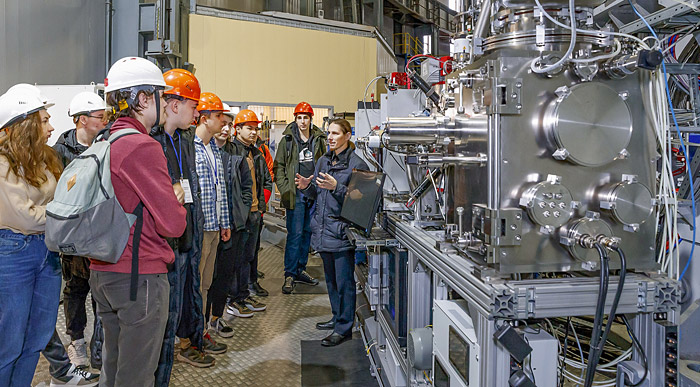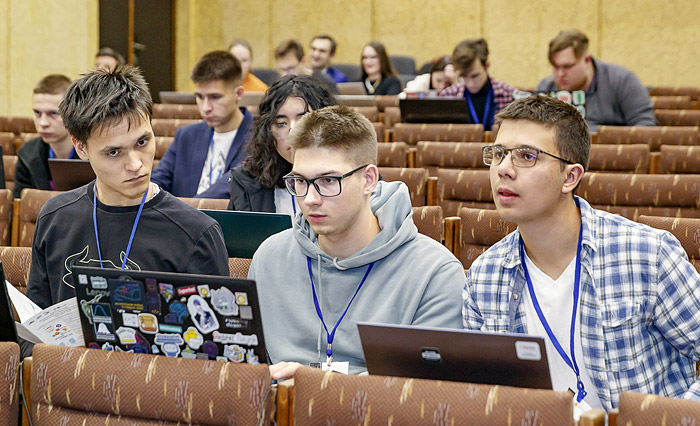
Electronic english version since 2022 |
The newspaper was founded in November 1957
| |
|
Number 40 (4688) |
Schools
For training young personnel
On 16 - 20 October, the "JINR Autumn School on Information Technologies" was held at MLIT.
For the second autumn, senior undergraduate and postgraduate students specializing in information technologies from Russian universities from Tver to Kamchatka gather in Dubna. They learn about the scientific projects and research tasks of the Joint Institute, listen to lectures by leading specialists from the Institute's laboratories, Russian universities and research centres. The school's topics include distributed computing in JINR research, simulation analysis and numerical methods, techniques and technologies for processing and analyzing information, JINR digital ecosystem, support and development of the JINR MICC. In addition to lectures, the School programme included practical classes, a hackathon on parallel computing, excursions to the NICA accelerator complex and the exhibition "Basic facilities of JINR".

"It is very pleasant that so many young people from all over the country have gathered at this School in order to learn something and later, perhaps, to join the big JINR family," Vice-Director of the Institute V.D.Kekelidze greeted the participants. "We live during the fourth information technology revolution. Of course, you know the creator of the World Wide Web Timothy Berners-Lee. He created the basis of WWW while working at the European physics centre CERN. JINR with its many projects is in dire need of advanced technologies. And it is MLIT that is at the forefront here. It's great that you are involved in this process. It will help you on your life path and develop your career.
"During the week of the Autumn School you will learn about the key areas of JINR research," Chairman of the School's Organizing Committee V.V.Korenkov congratulated the School participants on the start of its work. "You will be able to choose a topic for further work at your universities. At the spring school, you have time to adjust your work for high quality preparation and defense of your bachelor's or master's thesis. We have invited leading Russian specialists in the field of information technologies not only from JINR, but also from other organizations as lecturers at the School. The subject of the School, as compared to the first one, has expanded slightly due to an important project for us - "JINR digital ecosystem".
We can say that our experiment was a success. A year ago, we held the first School and more than 20 of its participants took our topic as the topic of their bachelor's or master's theses that they afterwards studied at their universities. I participated in the defense of most of these papers in Tver, St. Petersburg State University, North Ossetian State University and the results for all were good. The topics, on the one hand, turned out to be interesting and on the other hand, many of them have already been included in the scope of our papers. Many of those entering the graduate school do their dissertations on our topics. The geography of the second School remains the same - 52 students from 11 Russian universities participate in it. I wish you to choose a topic for work and in a sense, a way of life. You can use this knowledge and experience in different areas. We will be glad if you enter the graduate school at JINR or work with us, or cooperate with us at your universities.
And for our weekly, V.V.Korenkov added:
- The results of the first year were quite successful. At the second School, we set more stringent selection conditions: only those students that are intended to consider their work at JINR should come to us. We agreed with their supervisors that most of the topics for bachelor's and master's dissertations would be our topics. Spring school gives guidelines, then the main thing is defense at their home universities and afterwards, we'll see who comes to work to us.
"The cooperation of ISAU with MLIT in the training of specialists has a 30-year history," Director of the Institute of System Analysis and Management of the Dubna State University E.Yu.Kirpicheva congratulated its participants on the start of the School. "Among our teachers there are about 30 laboratory staff members, a third of them are ISAU graduates. We are proud of their successes, I am glad to see some of them among the organizers of this School. I wish success to all School participants, you have a unique opportunity to be in this centre, study in this centre and develop in this centre.
"The importance of the School is difficult to overestimate and there are several points here," Professor of St. Petersburg State University D.B.Degtyarev shared his opinion. "The first is that there are not only no such schools in Russia today, but they are rare for many reasons. First of all, because we have changed the paradigm of training specialists after the collapse of the Soviet Union. In the last 20 years, in the field of information technologies, they have been training either theoretic specialists, of whom few are needed, for the Academy of Sciences to draw tours on wheels, or specialists in the form of, let's say, outsourcing: this is the training of a programmer-coder that can serve mainly Western companies. It turned out that a very large number of universities focused on one of these two areas. "Will I get $400 if I learn Java in four months?" I remember such conversations well in the late 1990s - early 2000s, when I worked at ITMO. And when you need not just a technological focus, but a lot of long-term work is required, moving forward, on the cutting edge - this is not enough, where it was and is. And JINR is a happy exception, that is why I go here myself and take students. We even moved to open a new specialty, a new educational programme in information technologies, in order to train not a coder or a theorist, but a specialist capable of being at the cutting edge. And JINR is a place where distributed computing, big data, blockchains and let's say, complex scientific calculations are in demand. It's not for nothing that at IBM they always said: a person should think and a machine should work. Teaching a young person to think first and not to press buttons is the idea and feature of this School.
Director of the Laboratory A.N.Bugay told the participants of the School about the role of information technologies in the scientific programme of LRB JINR:
"In biology, we are constantly faced with the problem of a large volume of data that somehow needs to be processed. It should be noted that in biology, compared to physics, for example, many things are done by hand. It is very painstaking work. For instance, looking through a microscope and counting some events is a long and painstaking task. Even if modern technologies come to the rescue in the form of digital photography, photographs are still processed manually. To automate processing, modern technologies are needed in the form of computer vision and neural network approaches. Secondly, just like in high energy physics, there is a large pool of data in biology. Modern omics technologies, genomics and proteomics generate a very large array of data that have to somehow be linked and explained. Here, too, modern approaches are needed and we move in this similarly to physicists. And finally, simulation. The processes in biology are very complex, they require the use of high performance computing, a variety of computational approaches - this is the Monte Carlo method in radiation biology and molecular dynamics and complex dynamic systems and even modern quantum technologies gradually begin to come into use. And we also need to study those processes that take place at the submolecular level. In addition to fundamental, radiobiological, genetic and other problems, there are also applied aspects. This is space exploration and medicine - applications in cancer therapy, diagnostics, others and here information technology is also in great demand. You know that in medicine today they try to carry out diagnostics using artificial intelligence. So, we do similar things.
A person does not have to be a pure biologist or a pure mathematician. He has to understand the structure of the task. That is why we pay great attention to involving the IT sector in this kind of interdisciplinary research.
On the last day of School, students shared their impressions.

Fedor Shuvalov (St. Petersburg State University): Our Head of the department Alexander Borisovich Degtyarev told us a lot about JINR. At School, I was very interested, although much was not clear. I'm only in my second year of bachelor's degree, I don't have enough mathematical background and since my specialization is not physics, the physics lectures were a bit difficult. But in terms of profile, in distributed computing, a lot is clear and interesting. I gained insight into how technology is used in practice and understand where the field heads. I liked the excursion to the collider; it was interesting to see everything with my own eyes. I also liked the city, although small, but beautiful.
Viktor Koloskov (St. Petersburg State University): The impressions are only positive, very interesting, especially in topics related to my profile - "Big data and distributed digital platform". The lectures on machine learning and Josephson junctions were also interesting, although I am not a physicist, but I tried to understand. It's good that they give many examples of practical application. I participated in a hackathon, I don't know how well I did, but in general, it was also an interesting experience, for I have never participated in hackathons before.
Anna Loyko (Tula State University): It is difficult, but very interesting. I liked the lecture on radiobiology most of all, since my first education is two courses in biotechnology and I have been studying information technologies for the first year. Perhaps, I have found a topic for future research here.
Viktoria Pavlova (Tula State University): For me, this trip was an opportunity to learn where and how science is done in our country. And when you see all this with your own eyes, it is inspiring. I was impressed by the extent and depth of the research being carried out in real time. If you think about it, it's amazing. The trip turned out to be very eventful and there is a lot to think about.
Mikhail Kurbakov (Tula State University): This is my second year participating in this School. I liked everything last time, too. My area of specialization is machine learning, I am a second-year graduate student. I do not choose the topic for paper, but we have cooperation between laboratories. Alexey Zhemchugov and me practically started collaborating last year, but our laboratory at the university was unable to allocate time for this and I came here again to restart our communication.
Olga TARANTINA,
photo by Elena PUZYNINA